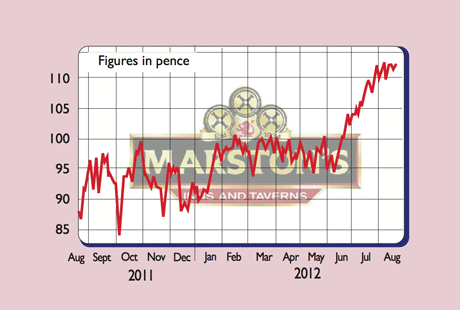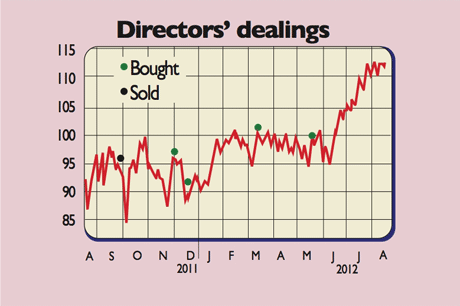Smart strategies deliver for indie brewer Marston's
Business is tough but, with sales growing, Marston’s is a buy for the brave, says Phil Oakley.
Get the latest financial news, insights and expert analysis from our award-winning MoneyWeek team, to help you understand what really matters when it comes to your finances.
You are now subscribed
Your newsletter sign-up was successful
Want to add more newsletters?

Twice daily
MoneyWeek
Get the latest financial news, insights and expert analysis from our award-winning MoneyWeek team, to help you understand what really matters when it comes to your finances.

Four times a week
Look After My Bills
Sign up to our free money-saving newsletter, filled with the latest news and expert advice to help you find the best tips and deals for managing your bills. Start saving today!
The business
Brewing and pub retailing operator Marston's owns 2,150 pubs and is one of the country's leading independent brewers. Its pubs have three different ownership models. Most of its 500 company-managed pubs consist of pub restaurants, where the focus is on offering good food at reasonable prices in a family-friendly environment. It also has some town-centre bars trading under the Pitcher & Piano brand. Marston's has 1,000 tenanted pubs where landlords rent the premises and agree to buy beer from the company. A further 600 pubs are based on franchises, where the landlord gets more help with food, drink, fixtures and fittings but pays a proportion of sales back to Marston's. The company has five regional breweries, which make premium cask ales, such as Marston's Pedigree and Hobgoblin.
The history
The Marston's of today has its roots in two companies. In 1834, John Marston set up the J Marston & Son brewery in Burton upon Trent. In 1875, Banks's and Company began brewing in Wolverhampton. In 1890, Banks's joined forces with two other brewers to form the Wolverhampton & Dudley Brewery. Over the next hundred years both companies became prominent brewers and pub owners, particularly in the West Midlands and north-west of England. In 1999 both companies became embroiled in a hostile takeover battle that saw them try to buy each other.
Wolverhampton & Dudley eventually prevailed. But two years later the firm only just managed to fight off a takeover bid from Pubmaster. The new, bigger company continued to buy out smaller niche brewers and pub operators during the early 2000s. Like many of its peers, Marston's has borrowed lots of money against the value of its pubs in recent years. Thankfully it has managed to avoid the sort of financial distress experienced by firms such as Punch Taverns and Enterprise Inns. While times have been hard, the company's strategy of building new pubs focusing on food and families has helped it recover from the recession. Many of its pub restaurants are now doing reasonably well and earning good returns for shareholders.
MoneyWeek
Subscribe to MoneyWeek today and get your first six magazine issues absolutely FREE

Sign up to Money Morning
Don't miss the latest investment and personal finances news, market analysis, plus money-saving tips with our free twice-daily newsletter
Don't miss the latest investment and personal finances news, market analysis, plus money-saving tips with our free twice-daily newsletter
The chief executive
Ralph Findlay has been chief executive since 2001. Before that he was finance director. He has also chaired the British Beer and Pub Association (BBPA), where he has been a staunch campaigner for the pub industry. He led the BBPA's "Grain to Glass" campaign, highlighting the importance of brewing and pubs to Britain's rural economy. His basic salary was £465,000 in 2011.
Should you buy the shares?

There's currently a lot of doom and gloom surrounding the pub industry. Around 4,500 British pubs have shut since 2008 as the recession, tax hikes and cheap supermarket prices have meant more people drinking at home. The smoking ban introduced in July 2007 also hit many smaller, backstreet pubs. But that doesn't mean that pubs can't be a good investment, just as long as they use smart strategies. Despite the recession, families still like to dine out. This means that companies such as Marston's, with a focus on food and good value, can still do well.
The same goes for beer. The demand for bland, mass-produced beer that used to be the mainstay of backstreet locals has gone. With drinks such as Pedigree and good local beers, Marston's can satisfy the more discerning drinker. It's far from plain sailing, though. Most of Marston's profits still come from drinks-led tenanted pubs, where business is tough. Moving a lot of these pubs to franchises looks like the right thing to do. Marston's also has too much debt for our liking, with profits covering interest payments just over two times. We'd like to see this improve and there are signs that it can. With sales growing in its pub restaurants, profits and dividends should increase. The business is not without risks, but the shares look quite cheap with a high yield that's well covered by profits. We think the shares are worth buying for dividend income.
The numbers

Directors' shareholdings
R Findlay: 859,463
A Andrea: 92,959
A Darby: 196,384
What the analysts say
Buy: 13
Hold: 3
Sell 1
Average price target 125p
Key facts
Stockmarket code: MARS
Share price: 111p
Market cap: £636m
Net assets (March 2012): £806m
Net debt (March 2012): £1,124m
P/e (current year estimate): 9.0 times
Yield (prospective): 5.5%
Get the latest financial news, insights and expert analysis from our award-winning MoneyWeek team, to help you understand what really matters when it comes to your finances.
Phil spent 13 years as an investment analyst for both stockbroking and fund management companies.
-
 Should you buy an active ETF?
Should you buy an active ETF?ETFs are often mischaracterised as passive products, but they can be a convenient way to add active management to your portfolio
-
 Power up your pension before 5 April – easy ways to save before the tax year end
Power up your pension before 5 April – easy ways to save before the tax year endWith the end of the tax year looming, pension savers currently have a window to review and maximise what’s going into their retirement funds – we look at how